橡胶沥青混合料路用性能研究
- 格式:pdf
- 大小:197.81 KB
- 文档页数:3
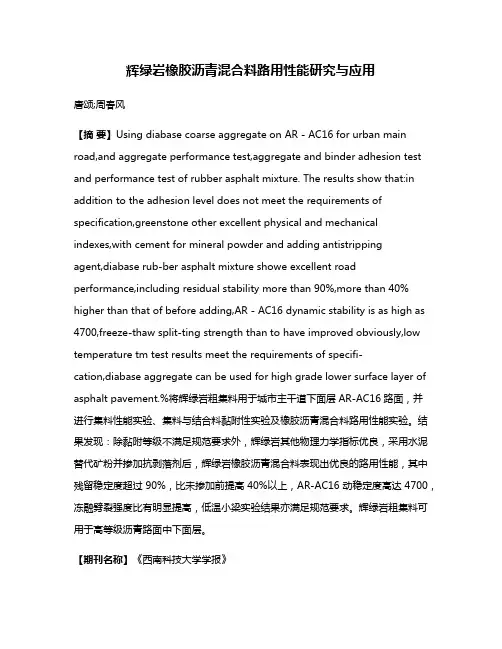
辉绿岩橡胶沥青混合料路用性能研究与应用唐颂;周春风【摘要】Using diabase coarse aggregate on AR - AC16 for urban main road,and aggregate performance test,aggregate and binder adhesion test and performance test of rubber asphalt mixture. The results show that:in addition to the adhesion level does not meet the requirements of specification,greenstone other excellent physical and mechanical indexes,with cement for mineral powder and adding antistrippingagent,diabase rub-ber asphalt mixture showe excellent road performance,including residual stability more than 90%,more than 40% higher than that of before adding,AR - AC16 dynamic stability is as high as 4700,freeze-thaw split-ting strength than to have improved obviously,low temperature tm test results meet the requirements of specifi-cation,diabase aggregate can be used for high grade lower surface layer of asphalt pavement.%将辉绿岩粗集料用于城市主干道下面层AR-AC16路面,并进行集料性能实验、集料与结合料黏附性实验及橡胶沥青混合料路用性能实验。
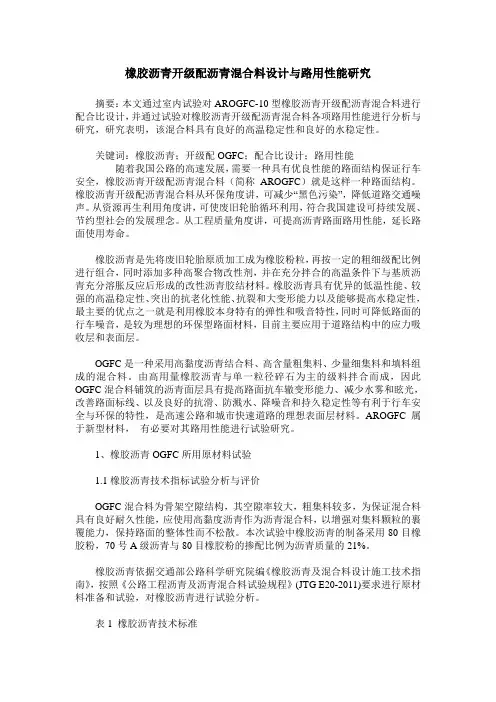
橡胶沥青开级配沥青混合料设计与路用性能研究摘要:本文通过室内试验对AROGFC-10型橡胶沥青开级配沥青混合料进行配合比设计,并通过试验对橡胶沥青开级配沥青混合料各项路用性能进行分析与研究,研究表明,该混合料具有良好的高温稳定性和良好的水稳定性。
关键词:橡胶沥青;开级配OGFC;配合比设计;路用性能随着我国公路的高速发展,需要一种具有优良性能的路面结构保证行车安全,橡胶沥青开级配沥青混合料(简称AROGFC)就是这样一种路面结构。
橡胶沥青开级配沥青混合料从环保角度讲,可减少“黑色污染”,降低道路交通噪声。
从资源再生利用角度讲,可使废旧轮胎循环利用,符合我国建设可持续发展、节约型社会的发展理念。
从工程质量角度讲,可提高沥青路面路用性能,延长路面使用寿命。
橡胶沥青是先将废旧轮胎原质加工成为橡胶粉粒,再按一定的粗细级配比例进行组合,同时添加多种高聚合物改性剂,并在充分拌合的高温条件下与基质沥青充分溶胀反应后形成的改性沥青胶结材料。
橡胶沥青具有优异的低温性能、较强的高温稳定性、突出的抗老化性能、抗裂和大变形能力以及能够提高水稳定性,最主要的优点之一就是利用橡胶本身特有的弹性和吸音特性,同时可降低路面的行车噪音,是较为理想的环保型路面材料,目前主要应用于道路结构中的应力吸收层和表面层。
OGFC是一种采用高黏度沥青结合料、高含量粗集料、少量细集料和填料组成的混合料。
由高用量橡胶沥青与单一粒径碎石为主的级料拌合而成,因此OGFC混合料铺筑的沥青面层具有提高路面抗车辙变形能力、减少水雾和眩光,改善路面标线、以及良好的抗滑、防溅水、降噪音和持久稳定性等有利于行车安全与环保的特性,是高速公路和城市快速道路的理想表面层材料。
AROGFC属于新型材料,有必要对其路用性能进行试验研究。
1、橡胶沥青OGFC所用原材料试验1.1橡胶沥青技术指标试验分析与评价OGFC混合料为骨架空隙结构,其空隙率较大,粗集料较多,为保证混合料具有良好耐久性能,应使用高黏度沥青作为沥青混合料,以增强对集料颗粒的裹覆能力,保持路面的整体性而不松散。
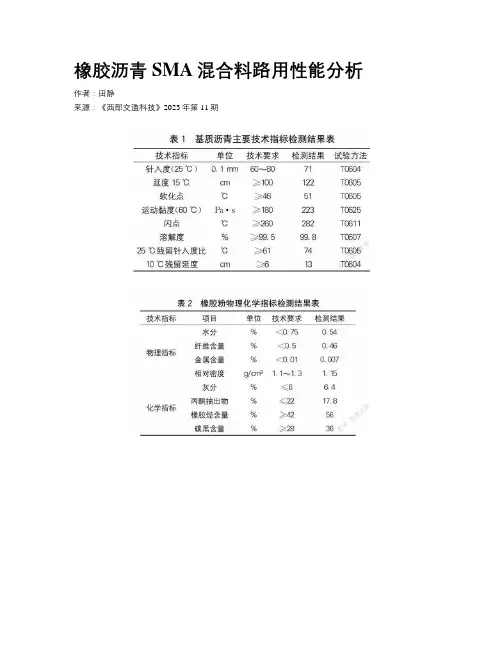
橡胶沥青SMA混合料路用性能分析作者:***来源:《西部交通科技》2023年第11期摘要:文章为研究橡胶沥青SMA混合料的路用性能,分别选取添加裂解剂和不添加裂解剂的两种混合料,通过试验分析其各项技术性能。
结果表明,两种橡胶沥青SMA混合料的各项指标均高于规定值,满足要求;添加裂解剂的混合料高温稳定性略有下降,其他性能均有所提升,说明添加裂解剂的混合料较没添加的混合料路用性能更佳。
关键词:橡胶沥青SMA混合料;路用性能;高温稳定性;低温抗裂性0引言SMA沥青混合料中粗集料含量较高,沥青路面结构整体稳定性高[1],具有良好的路用性能。
采用橡胶沥青作为结合料可进一步提升混合料的路用性能。
橡胶沥青SMA混合料的路用性能更佳[2],橡胶的弹性和柔性会在高温季节降低路面的永久变形,提升弹性恢复能力;低温条件下,添加橡胶颗粒后可提升沥青路面的抗拉强度[3],减少低温开裂,提高使用寿命。
为研究橡胶沥青SMA混合料路用性能,分别选取添加裂解剂和不添加裂解剂两种混合料开展试验,通过对比分析确定混合料的路用性能。
1 原材料检验1.1 沥青技术性能检验本研究橡胶沥青SMA混合料基质沥青选用壳牌70#沥青,沥青等级为A级。
按照试验要求取样对基质沥青各主要技术性能指标进行检测,检测结果如表1所示。
根据试验检测结果可知,基质沥青各指标均满足《沥青及沥青混合料试验规程》(JTG E20-2011)中相关要求,满足橡胶沥青SMA混合料设计要求。
1.2 橡胶粉技术性能检验为节约成本、变废为宝,本研究橡胶沥青SMA混合料橡胶粉选用废旧轮胎橡胶粉。
按照规定工艺将废旧轮胎加工成橡胶颗粒,根据粒径、目数、溶胀速度的要求,确定橡胶粉的粒径和级配等指标。
本项目选择40目橡胶粉,其主要物理和化学指标检测结果如表2所示。
根据检测结果可知,各指标均满足设计要求,可以使用。
1.3 集料技术性能检验本研究选用玄武岩粗集料。
玄武岩密度大、强度高[4],是优质的橡胶沥青SMA混合料路面面层材料。

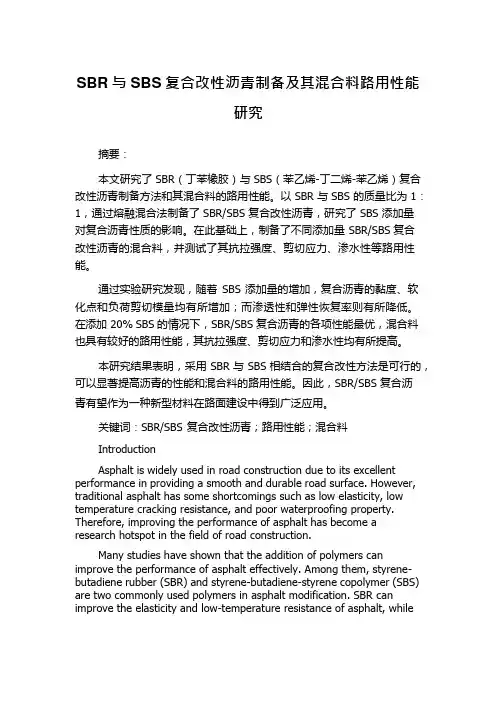
SBR 与SBS 复合改性沥青制备及其混合料路用性能研究摘要:本文研究了SBR(丁苯橡胶)与SBS(苯乙烯-丁二烯-苯乙烯)复合改性沥青制备方法和其混合料的路用性能。
以SBR 与SBS 的质量比为1:1,通过熔融混合法制备了SBR/SBS 复合改性沥青,研究了SBS 添加量对复合沥青性质的影响。
在此基础上,制备了不同添加量SBR/SBS 复合改性沥青的混合料,并测试了其抗拉强度、剪切应力、渗水性等路用性能。
通过实验研究发现,随着SBS 添加量的增加,复合沥青的黏度、软化点和负荷剪切模量均有所增加;而渗透性和弹性恢复率则有所降低。
在添加20% SBS 的情况下,SBR/SBS 复合沥青的各项性能最优,混合料也具有较好的路用性能,其抗拉强度、剪切应力和渗水性均有所提高。
本研究结果表明,采用SBR 与SBS 相结合的复合改性方法是可行的,可以显著提高沥青的性能和混合料的路用性能。
因此,SBR/SBS 复合沥青有望作为一种新型材料在路面建设中得到广泛应用。
关键词:SBR/SBS 复合改性沥青;路用性能;混合料IntroductionAsphalt is widely used in road construction due to its excellent performance in providing a smooth and durable road surface. However, traditional asphalt has some shortcomings such as low elasticity, low temperature cracking resistance, and poor waterproofing property. Therefore, improving the performance of asphalt has become a research hotspot in the field of road construction.Many studies have shown that the addition of polymers can improve the performance of asphalt effectively. Among them, styrene- butadiene rubber (SBR) and styrene-butadiene-styrene copolymer (SBS) are two commonly used polymers in asphalt modification. SBR can improve the elasticity and low-temperature resistance of asphalt, whileSBS can enhance the high-temperature stability and waterproofing property of asphalt. Therefore, combining SBR and SBS to modify asphalt is expected to achieve a comprehensive improvement in its performance.In this study, SBR/SBS composite modified asphalt was prepared by melt blending method, and the effect of SBS content on the properties of composite asphalt was investigated. Furthermore, the performance of different SBR/SBS composite modified asphalt mixtures was tested to evaluate their road usage efficiency.ExperimentalMaterials:Asphalt: A pen grade 60/70 asphalt was used as the base material.SBR: A commercial grade SBR with a styrene content of 23% was used.SBS: A commercial grade SBS with a styrene content of 30% was used.Preparation of SBR/SBS composite modified asphalt:SBR and SBS were characterized by their respective melting points to ensure that they were fully melted before being added to the asphalt. Then, SBR and SBS were added to the asphalt at a SBR/SBS mass ratio of 1:1. The mixture was stirred at 170°C for 3 hours until a uniform composite modified asphalt was obtained. The SBS content was adjusted to 10%, 15%, and 20% of the total amount of SBR/SBS to prepare three different composite modified asphalt samples.Performance testing of SBR/SBS composite modified asphalt mixture:The SBR/SBS composite modified asphalt mixture was prepared according to the Marshall method. The mixture was compacted and molded into cylindrical samples with a diameter of 63.5mm and a height of 63.5mm. The samples were then tested for their tensile strength, shear stress, and water permeability according to the relevant standards.Results and discussionEffect of SBS content on composite modified asphalt:The rheological properties of SBR/SBS composite modified asphalt with different SBS contents were analyzed through dynamic shearrheometer tests. The results showed that the addition of SBS could increase the viscosity, softening point, and negative load shear modulus of the composite modified asphalt. With the increase of SBS content, the improvement of these properties becomes more pronounced. Based on this, the optimal SBS content was determined to be 20%.Effect of SBS content on composite modified asphalt mixture:The mechanical properties of the SBR/SBS composite modified asphalt mixture were tested for different SBS contents. The results showed that increasing the SBS content could increase the tensile strength and shear stress of the mixture. However, the water permeability and elastic recovery rate of the mixture decreased with the increase of SBS content. When the SBS content was 20%, the composite modified asphalt mixture had the best road usage performance.ConclusionThe SBR/SBS composite modified asphalt prepared by melt blending method has the potential to significantly improve the performance of asphalt. The addition of SBS can increase the viscosity, softening point, and negative load shear modulus of the composite modified asphalt, while reducing its permeability and elastic recovery rate. With the optimal SBS content of 20%, the SBR/SBS composite modified asphalt mixture obtained exhibited good mechanical properties including improved tensile strength, shear stress, and water permeability.The use of SBR/SBS composite modified asphalt has great potential in road construction, and further research should be conducted to explore its application prospects in this field.。
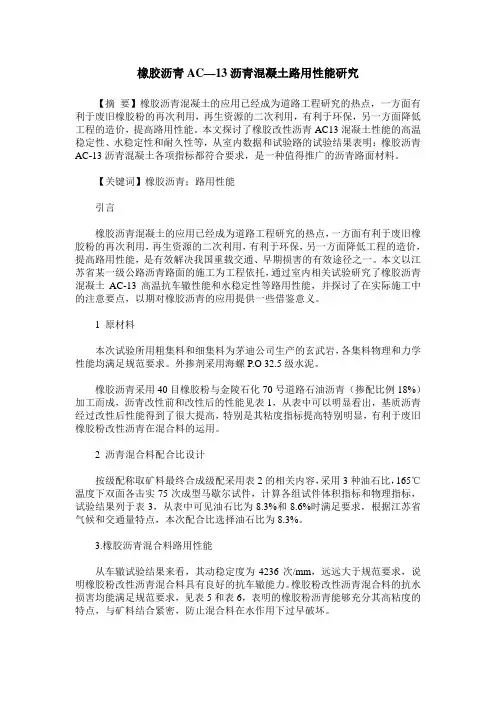
橡胶沥青AC—13沥青混凝土路用性能研究【摘要】橡胶沥青混凝土的应用已经成为道路工程研究的热点,一方面有利于废旧橡胶粉的再次利用,再生资源的二次利用,有利于环保,另一方面降低工程的造价,提高路用性能。
本文探讨了橡胶改性沥青AC13混凝土性能的高温稳定性、水稳定性和耐久性等,从室内数据和试验路的试验结果表明:橡胶沥青AC-13沥青混凝土各项指标都符合要求,是一种值得推广的沥青路面材料。
【关键词】橡胶沥青;路用性能引言橡胶沥青混凝土的应用已经成为道路工程研究的热点,一方面有利于废旧橡胶粉的再次利用,再生资源的二次利用,有利于环保,另一方面降低工程的造价,提高路用性能,是有效解决我国重载交通、早期损害的有效途径之一。
本文以江苏省某一级公路沥青路面的施工为工程依托,通过室内相关试验研究了橡胶沥青混凝土AC-13高温抗车辙性能和水稳定性等路用性能,并探讨了在实际施工中的注意要点,以期对橡胶沥青的应用提供一些借鉴意义。
1 原材料本次试验所用粗集料和细集料为茅迪公司生产的玄武岩,各集料物理和力学性能均满足规范要求。
外掺剂采用海螺P.O 32.5级水泥。
橡胶沥青采用40目橡胶粉与金陵石化70号道路石油沥青(掺配比例18%)加工而成,沥青改性前和改性后的性能见表1,从表中可以明显看出,基质沥青经过改性后性能得到了很大提高,特别是其粘度指标提高特别明显,有利于废旧橡胶粉改性沥青在混合料的运用。
2 沥青混合料配合比设计按级配称取矿料最终合成级配采用表2的相关内容,采用3种油石比,165℃温度下双面各击实75次成型马歇尔试件,计算各组试件体积指标和物理指标,试验结果列于表3,从表中可见油石比为8.3%和8.6%时满足要求,根据江苏省气候和交通量特点,本次配合比选择油石比为8.3%。
3.橡胶沥青混合料路用性能从车辙试验结果来看,其动稳定度为4236次/mm,远远大于规范要求,说明橡胶粉改性沥青混合料具有良好的抗车辙能力。
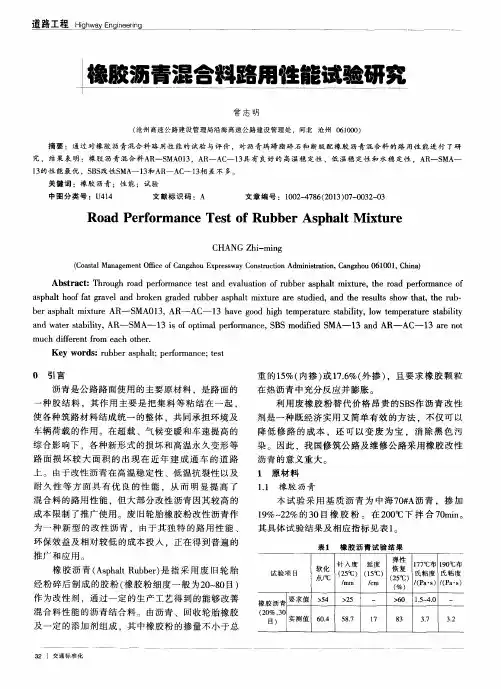
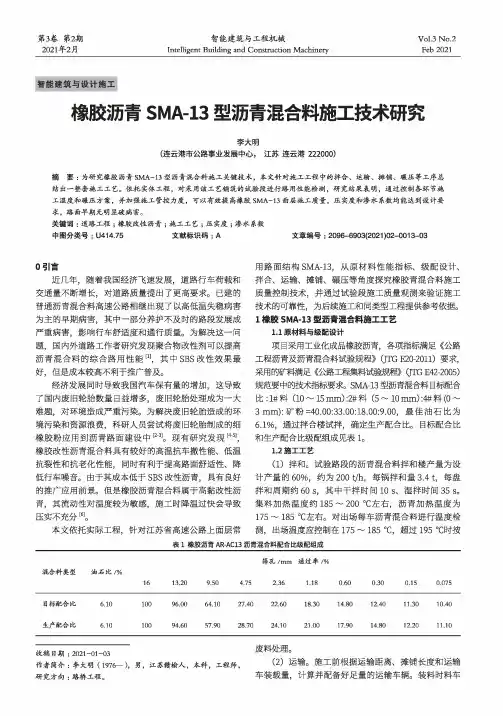
智能建筑与工程机械Intelligent Building and Construction Machinery Vol.3No.2 Feb2021第3卷第2期2021年2月智能建筑与设计施工橡胶沥青SMA-13型沥青混合料施工技术研究李大明(连云港市公路事业发展中心,江苏连云港222000)摘要:为研究橡胶沥青SMA-13型沥青混合料施工关键技术,本文针对施工工程中的拌合、运输、摊铺、碾压等工序总结出一整套施工工艺。
依托实体工程,对采用该工艺铺筑的试验段进行路用性能检测,研究结果表明,通过控制各环节施工温度和碾压方案,并加强施工管控力度,可以有效提高橡胶SMA-13面层施工质量,压实度和渗水系数均能达到设计要求,路面早期无明显破病害。
关键词:道路工程;橡胶改性沥青;施工工艺;压实度;渗水系数中图分类号:U414.75文献标识码:A文章编号:2096-6903(2021)02-0013-030引言近几年,随着我国经济飞速发展,道路行车荷载和交通量不断增长,对道路质量提出了更高要求。
已建的普通沥青混合料高速公路相继出现了以高低温失稳病害为主的早期病害,其中一部分养护不及时的路段发展成严重病害,影响行车舒适度和通行质量。
为解决这一问题,国内外道路工作者研究发现聚合物改性剂可以提高沥青混合料的综合路用性能巴其中SBS改性效果最好,但是成本较高不利于推广普及。
经济发展同时导致我国汽车保有量的增加,这导致了国内废旧轮胎数量日益增多,废旧轮胎处理成为一大难题,对环境造成严重污染。
为解决废旧轮胎造成的环境污染和资源浪费,科研人员尝试将废旧轮胎制成的细橡胶粉应用到沥青路面建设中[2'3]o现有研究发现心],橡胶改性沥青混合料具有较好的高温抗车撤性能、低温抗裂性和抗老化性能,同时有利于提高路面舒适性、降低行车噪音。
由于其成本低于SBS改性沥青,具有良好的推广应用前景。
但是橡胶沥青混合料属于高黏改性沥青,其流动性对温度较为敏感,施工时降温过快会导致压实不充分问。
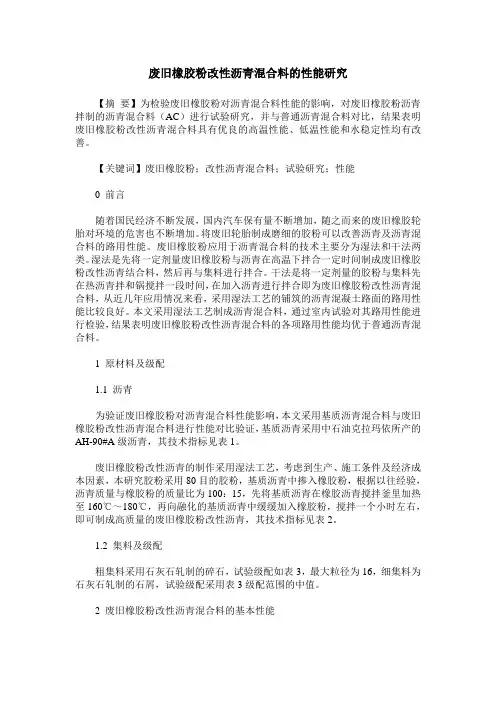
废旧橡胶粉改性沥青混合料的性能研究【摘要】为检验废旧橡胶粉对沥青混合料性能的影响,对废旧橡胶粉沥青拌制的沥青混合料(AC)进行试验研究,并与普通沥青混合料对比,结果表明废旧橡胶粉改性沥青混合料具有优良的高温性能、低温性能和水稳定性均有改善。
【关键词】废旧橡胶粉;改性沥青混合料;试验研究;性能0 前言随着国民经济不断发展,国内汽车保有量不断增加,随之而来的废旧橡胶轮胎对环境的危害也不断增加。
将废旧轮胎制成磨细的胶粉可以改善沥青及沥青混合料的路用性能。
废旧橡胶粉应用于沥青混合料的技术主要分为湿法和干法两类。
湿法是先将一定剂量废旧橡胶粉与沥青在高温下拌合一定时间制成废旧橡胶粉改性沥青结合料,然后再与集料进行拌合。
干法是将一定剂量的胶粉与集料先在热沥青拌和锅搅拌一段时间,在加入沥青进行拌合即为废旧橡胶粉改性沥青混合料,从近几年应用情况来看,采用湿法工艺的铺筑的沥青混凝土路面的路用性能比较良好。
本文采用湿法工艺制成沥青混合料,通过室内试验对其路用性能进行检验,结果表明废旧橡胶粉改性沥青混合料的各项路用性能均优于普通沥青混合料。
1 原材料及级配1.1 沥青为验证废旧橡胶粉对沥青混合料性能影响,本文采用基质沥青混合料与废旧橡胶粉改性沥青混合料进行性能对比验证,基质沥青采用中石油克拉玛依所产的AH-90#A级沥青,其技术指标见表1。
废旧橡胶粉改性沥青的制作采用湿法工艺,考虑到生产、施工条件及经济成本因素,本研究胶粉采用80目的胶粉,基质沥青中掺入橡胶粉,根据以往经验,沥青质量与橡胶粉的质量比为100:15,先将基质沥青在橡胶沥青搅拌釜里加热至160℃~180℃,再向融化的基质沥青中缓缓加入橡胶粉,搅拌一个小时左右,即可制成高质量的废旧橡胶粉改性沥青,其技术指标见表2。
1.2 集料及级配粗集料采用石灰石轧制的碎石,试验级配如表3,最大粒径为16,细集料为石灰石轧制的石屑,试验级配采用表3级配范围的中值。
2 废旧橡胶粉改性沥青混合料的基本性能2.1 高温性能2.1.1 高温稳定性本文高温稳定性评价分别对两组混合料进行车辙试验,一组为基质沥青AC-16,一组为废旧橡胶粉改性沥青AC-16,试验温度为60℃,轮压为0.7MPa,试件采用碾压成型的300mm×300mm×50mm车辙试件。
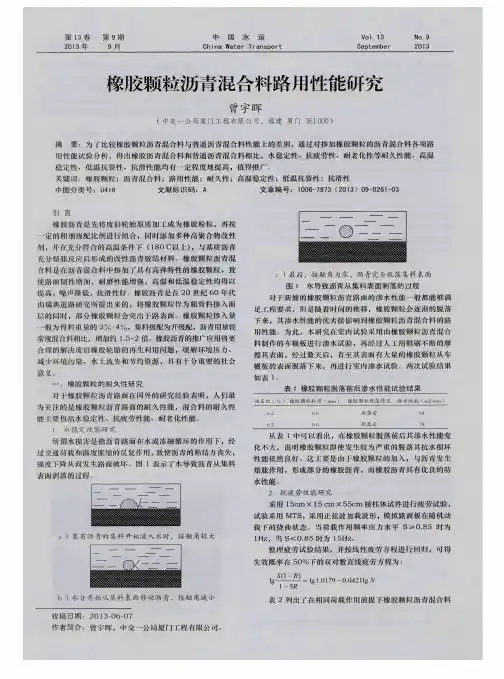
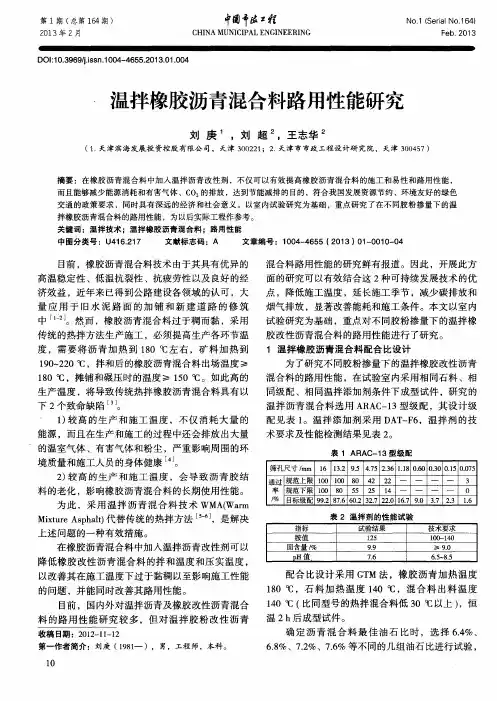
公路 2009年2月 第2期 HIGHWA Y Feb12009 No12 文章编号:0451-0712(2009)02-0061-05 中图分类号:U416121 文献标识码:A 橡胶沥青灌入式半柔性路面的应用研究凌天清1,董营营1,夏 伟1,赵之杰2,李昌铸2,刘燕燕1,熊出华1 (11重庆交通大学 重庆市 400074;21北京新桥技术发展有限公司 北京市 100088)摘 要:针对橡胶粉改性沥青半柔性路面的设计方法、高温稳定性、低温抗裂性和水稳定性等性能进行室内试验研究,表明橡胶沥青半柔性路面具有良好的路用性能。
在此基础上对其施工工艺进行研究,并进行实体工程的铺筑。
通过室内试验及工程实践应用表明,橡胶沥青半柔性路面具有很好的应用前景。
关键词:道路工程;半柔性路面;橡胶沥青;路用性能;应力吸收层;施工工艺 随着废轮胎橡胶粉工业化生产的推动及路面结构研究的深入,废橡胶粉作为一种新型道路建筑材料,能显著改善沥青混凝土的性能,被越来越多地应用到公路工程建设中。
通过在沥青中添加废橡胶粉,制成改性沥青是实现这一目标的有效途径。
同时,作为沥青改性剂的废橡胶粉又为废旧轮胎的处理提供了一条好途径。
半柔性路面通常是指在开级配多孔基体沥青混合料中,填充以水泥为主要成分的特殊水泥胶浆而形成的兼具沥青混凝土路面与水泥混凝土路面特点的复合式路面。
本文在灌入式半柔性路面研究成果的基础上,考虑到废橡胶沥青节能环保的特点,对废橡胶粉改性沥青半柔性路面的应用技术进行了探讨和研究。
1 废橡胶沥青半柔性路面混合料的配合比研究111 原材料性能分析(1)废橡胶粉为常温粉碎自然级配橡胶粉,级配组成见表1。
表1 废橡胶粉级配组成项目下列筛孔(mm)的通过百分率/%21361118016013011501075级配10010971361142016615217(2)橡胶沥青由基质沥青A H-70加工而成,性能指标见表2。
(3)采用P1O4215R普通硅酸盐水泥、Ⅱ级粉 表2 橡胶沥青性能检测结果试验项目设计要求橡胶沥青掺量/%-19针入度(25℃)/011mm35~5540软化点/℃>606914 25℃弹性恢复/%>7085旋转粘度(180℃,20r/min)/(Pa・s)115~510319煤灰、长江特细砂,粗集料采用石灰岩碎石屑,细集料选用石灰岩石屑,石灰石矿粉作填料,材料性质均符合《公路沥青混凝土路面施工技术规范》(J T G F40-2004)[1]的技术要求。
新型SMA-13橡胶沥青混合料在市政道路工程中的应用摘要:如今,人们对市政道路质量的要求越来越高,为此很多市政道路工程都开始运用高黏高弹改性沥青SMA-13面层。
而作为一种技术要求极高的面层,其施工存在一定难度,有必要对其施工技术进行深入的分析和探讨。
基于此,本篇文章对新型SMA-13橡胶沥青混合料在市政道路工程中的应用进行研究,以供参考。
关键词:新型SMA-13;橡胶沥青混合料;市政道路工程;应用分析引言SMA是一种骨架嵌挤型沥青混合料,具有沥青多、石料多、矿粉多,细集料少的特点。
由于其具有较厚的沥青油膜,致使其在通车初期表现出路面抗滑性能较差的特征。
1研究背景近年来,随着汽车工业的快速发展,废旧的橡胶轮胎日益增多,每年数亿条的废旧轮胎不但储占用大量土地,并对环境带来极大的污染,为了解决废旧轮胎造成的黑色污染,将废旧轮胎变废为宝,目前国内公路建设中已大范围推广橡胶粉改性沥青,即将废旧的轮胎研磨成粉加入沥青中制成橡胶粉改性沥青,该沥青高温敏感性、稳定性和低温抗开裂性能都得到显著提高,且施工完成的路面在行车舒适度、降低路面噪音等方面有显著的优势。
2工程概况某项目的机动车道路面结构如下:垫层采用级配碎石,铺设厚度为20cm;下基层采用水泥含量为6%的水稳层,铺筑厚度为20cm;上基层采用水泥含量为4%的水稳层,铺筑厚度与上基层一致。
在基层与面层之间做表层处理,采用乳化沥青,层厚为1cm。
在基层上摊铺AC-25C沥青混凝土,碾压后厚度为7cm,紧接着施工AC-20C沥青混凝土,碾压后厚度为5cm,最后施工新型SMA-13橡胶沥青混凝土,要求完成面层的厚度为4cm。
3新型SMA-13橡胶沥青混合料在市政道路工程中的应用分析3.1原材料3.1.1基质沥青本工程基质沥青选用70号沥青,质量等级为A级,基质沥青的检测结果如下:闪点为290℃,含蜡量(蒸馏法)为0.4%,密度(15℃)为1.016g/cm3,软化点为46.8℃,溶解度为99.85%,延度(10℃,5cm/min)为20cm,针入度(25℃,100g,5s)为71.5,TFOT后残留物延度(10℃)为11cm,针入度比为66%,质量损失为-0.14%,检测结果符合规范要求。
SBS+橡胶复合改性沥青路用性能分析摘要:设计了一种复合改性沥青,该复合改性沥青中添加15%橡胶粉和3%的SBS,并设计实验评价其路用性能,实验结果表明该混合料的低温抗裂性、高温稳定性和、水稳定性均优于规范要求。
实体试验段的性能也优于规范要求。
关键词:改性沥青;配合比;路用性能1.SBS与橡胶粉复合掺量SBS与橡胶粉是改性沥青的两种常用掺剂,以适当比例掺于沥青之中可形成SBS改性沥青及橡胶改性沥青。
SBS改性沥青中SBS参量一般在3%~6%,橡胶改性沥青中橡胶粉的掺量一般为15%~25%。
SBS+橡胶复合改性沥青需同时掺加两种改性剂,故将两种改性剂的掺量在但用掺量的基础上适当降低,SBS降低到1%~3%,橡胶粉降低到5%~20%,共设计12种复合参配比,并测试其性能指标。
参配量及性能测试指标见表1。
表1 SBS与橡胶粉复合掺量及性能指标测试结果由于该类沥青将用于广州地区,因此要求其具有较好的高温稳定性,在各项指标均满足技术要求的基础上,要求针入度较小,软化点较高,延度应满足技术要求,弹性恢复尽可能大。
根据试验结果,选择的复合参配比为15%橡胶粉+3%SBS改性剂。
2.混合料配合比设计本文采用马歇尔法设计了ARAC-10沥青混合料配合比,并制作了6.7%、7.0%、7.3%三种油石比下的试件,试件实测技术指标见表2。
由试验可知,混合料最佳油石比为7.0%。
表2不同油石比初试级配马歇尔试件技术指标3.路用性能试验从高温稳定性、低温抗裂性、水稳定性等方面评价该沥青混合料的路用性能,制作试件并进行了相关试验。
(1)高温稳定性沥青混合料的高温性能是指在高温和交通荷载双重作用下沥青路面抵抗变形的能力。
本文使用了车辙试验的方法,制作了热拌热压、热拌温压、热拌温压加助碾剂三组试件,三组试件的动稳定度分别是4811次/mm、4428次/mm、4762次/mm,均远高于规范要求的3500次/mm。
其中热拌热压成型的沥青混合料动稳定度最高,热拌温压成型的沥青混合料动稳定度略低于热拌热压沥青混合料,但加入碾压助剂之后热拌温压沥青混合料动稳定度有所提高,接近于热拌热压成型的沥青混合料,说明碾压助剂能改善沥青混合料的压实特性,使其在较低的温度下也能保证较好地压实。
论文THESIS102 China Highway在工程生产和建设过程中注重环境保护,早已成为国内乃至全世界范围的共识。
在这种背景下,温拌沥青混合料技术应运而生,其材料性能及路用性能在业内得到广泛的研究,并获得普遍认可。
相较于热拌沥青混合料,温拌沥青混合料较低的生产和施工温度,在能源节约及减少碳排放等方面效果显著。
据相关资料显示,掺加温拌剂后的沥青混合料的生产、施工温度比普通热拌混合料,特别是普通改性沥青混合料要降低30℃~50℃。
不同的温拌掺加剂对热拌沥青混合料的路用性能必然产生影响,研究表明温拌沥青混合料的路用性能并不次于普通的热拌沥青混合料,均能满足技术规范要求,甚至能提升混合料的高温、低温以及水稳定性能。
本文以Evothern 温拌沥青混合料为研究对象,对比橡胶沥青混合料的路用性能,研究Evothern 温拌沥青混合料的路用性能。
原材料试验材料采用壳牌90#基质沥青,其技术指标如表1所示。
橡胶粉采用40目斜胎胶粉,其技术指标如表2所示。
矿质集料及矿粉均为石灰岩质,温拌掺加剂熔点为99℃,当温度高于116℃则可完全溶于沥青胶结料。
Evothern温拌橡胶沥青混合料的路用性能分析文/新疆维吾尔自治区交通规划勘察设计研究院 艾克拜尔·艾尔肯表1基质沥青技术指标表2 橡胶粉技术指标试验方法胶结料的制备试验采用的橡胶改性沥青的制备如下:将橡胶粉与壳牌90#基质沥青按照一定比例混合,在研究控制的温度和时间下,通过高速剪切搅拌机混合拌制而成,制成后的橡胶改性沥青直接用于拌和混合料,以及温拌橡胶沥青的生产。
试验采用的Evothern 温拌橡胶沥青制备如下:将占沥青用量3%的温拌剂Evothern 加入到拌制完毕的橡胶改性沥青中,并搅拌两分钟,制备完成后即可直接用于混合料的拌制。
混合料拌和与压实温度的确定为研究温拌剂的掺加对橡胶改性沥青混合料路用性能的影响,试验采用AC-13合成级配,级配组成如表3所示。
橡胶改性沥青混合料性能及应用研究橡胶改性沥青混合料是指在传统沥青混合料中加入适量的废旧轮胎橡胶粉末,通过改善沥青的性能和加强沥青与骨料的粘结来提高混合料的性能和使用寿命。
本文将从橡胶改性沥青混合料的性能和应用两个方面进行研究探讨。
一、橡胶改性沥青混合料的性能1. 可塑性橡胶改性沥青混合料的可塑性较传统沥青混合料有所提高。
由于橡胶粉末的加入,可以增加沥青的柔韧性和延展性,使其在高温下不易软化,在低温下不易变脆,从而提高了混合料的耐久性和抗裂性。
2. 粘结性橡胶改性沥青混合料中的橡胶粉末可以与沥青充分融合,提高了沥青与骨料之间的粘结强度。
这样可以有效地减轻了骨料和沥青的剪切力,延长了混合料的使用寿命。
3. 耐老化性传统沥青混合料易受阳光、氧气和化学腐蚀等因素的影响而发生老化,导致混合料的使用寿命大大缩短。
而橡胶改性沥青混合料中的橡胶粉末可以有效地延缓沥青的老化过程,提高了混合料的耐久性和抗老化性能。
4. 抗水性橡胶改性沥青混合料因为橡胶的加入,使得混合料的抗水性得到了大幅提升。
在雨水的冲刷下,橡胶改性沥青混合料不易出现开裂和剥离现象,使得道路的使用寿命得到了有效延长。
二、橡胶改性沥青混合料的应用1. 道路建设橡胶改性沥青混合料在道路建设中有着广泛的应用。
它可以用于各类道路的路面铺装,如高速公路、城市道路、乡村道路等。
由于其优异的耐老化性能和抗水性能,可以有效提高道路的使用寿命和减少养护频次,降低了道路养护的成本和工作量。
2. 机场跑道建设在机场跑道的建设中,橡胶改性沥青混合料也有着广泛的应用。
由于机场跑道的使用频次相对较高,对混合料的耐磨性和抗裂性要求较高。
橡胶改性沥青混合料的耐磨性和抗裂性均较传统沥青混合料有所提高,可以有效满足机场跑道的使用要求。
3. 其他工程建设除了道路建设和机场跑道建设外,橡胶改性沥青混合料还可以广泛应用于其他工程建设中,如停车场、码头、工业场地等。
它的优异性能可以有效提高这些场所的使用寿命和减少养护成本,为各类工程建设提供了可靠的技术支持。